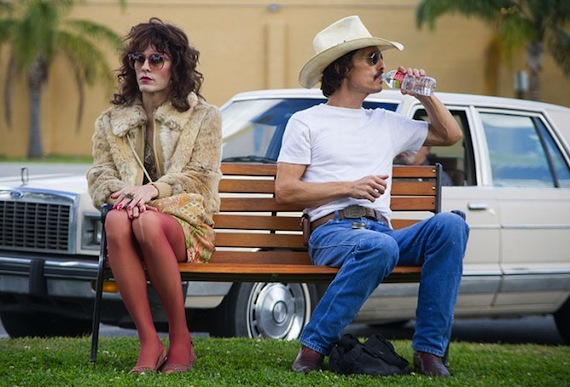By Armond White
How do you tell Ron Woodroof’s story so that it is both informative and enlightening? Woodroof, a not-altruistic Texas shitkicker who drank, drugged, chased tail and conned people, contracted AIDS in the mid-80s then became a self-made entrepreneur. He rejected the prescribed drug AZT (a prophetic decision), researched his options and sold alternative medicines to those who could afford it. Woodroof extended his life beyond doctors’ expectation but eventually succumbed which prevents his story in Dallas Buyers Club from seeming triumphant. So what is it, exactly?
 The film’s concept mostly avoids sentimentality starting with Matthew McConnaughey playing Woodroof in an extreme example of artistic dedication–losing weight to appear convincingly, repulsively unwell. But McConnaughey and his filmmaking associates, director Jean-Marc Vallee and screenwriters Craig Borten, Melisa Wallack, deny further identification with Woodroof by so thoroughly resisting audience affection (except for two sappy roles: a frustrated doctor played by Jennifer Garner and Woodroof’s business partner Rayon, a pre-op transexual played by Jared Leto).
The film’s concept mostly avoids sentimentality starting with Matthew McConnaughey playing Woodroof in an extreme example of artistic dedication–losing weight to appear convincingly, repulsively unwell. But McConnaughey and his filmmaking associates, director Jean-Marc Vallee and screenwriters Craig Borten, Melisa Wallack, deny further identification with Woodroof by so thoroughly resisting audience affection (except for two sappy roles: a frustrated doctor played by Jennifer Garner and Woodroof’s business partner Rayon, a pre-op transexual played by Jared Leto).
Maybe there’s a kind of integrity to McConnaughey’s method yet in the end it’s not so different from the same humorless stunt-performance route that actors have imitated since DeNiro’s physical transformation in Raging Bull. Not pitying Woodroof confuses sympathy with trite feeling. Woodroof’s hard-ass personality never develops–not even in the understanding that he shows to Rayon–and that’s more detrimental than the repugnant physical appearance.
McConnaughey’s wizened, spindly look evokes the ravaged image of Rock Hudson whose AIDS death is featured early in the film as a sign of that dark era and of the shocked naivete among Woodroof’s blue-collar homophobic folk. This suggests an actorly tribute to Hudson that’s more honorable than Steven Soderbergh’s ridicule of Liberace, another celebrity AIDS casualty in the disgraceful Behind the Candelabra, yet McConnaughey’s empathy doesn’t extend to the film’s almost affectless depiction of Texas grit and ingenuity.
Because Dallas Buyers Club is also a story about medical and entrepreneurial pioneering, Woodroof’s orneriness should reflect his culture as a study of American character. As a bio-pic, this is less smart-ass than Gus Van Sant’s Milk but unfortunately, the bio-pic momentum–a look at a prophet that is simultaneously a tragedy–goes downhill. And McConnaughey and Leto’s genuine efforts go with it. Their performances (McConnaughey’s deadly earnest and the dreamy sensitivity Leto’s had since playing Jordan Catalano on My So-Called Life) show good faith but are not on the same level as Eric Caravaca and Bruno Todeschini in Patrice Chereau’s Son Frere, the AIDS masterpiece that avoided mentioning AIDS.
Chereau’s emotional intensity got to the essence of physical tragedy and spiritual triumph while Dallas Buyers Club (a bizarre title for a bio-pic, it makes peace with capitalist greed and medical helplessness) seems afraid to show emotion about a topic where emotion is natural and earned. Dallas Buyer’s Club avoids identifying tragedy or triumph. Its modesty is immodest and feels wrong-headed. Part-pioneer bio-pic, part horror story, is this “entertainment”?
Follow Armond White on Twitter at 3xchair
